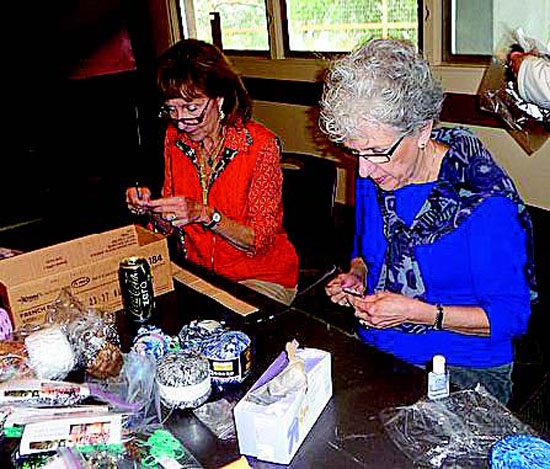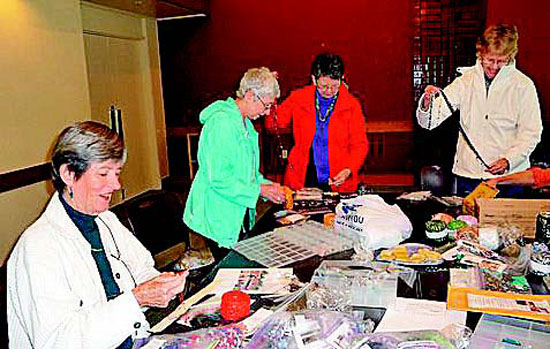 |
|
|
Diane Steuber and Julie Fulford crafting necklaces. Photos provided
|
|
|
|
|
|
Beginning with four ladies learning to crochet in January of 2012, the Congo Necklace Project at Lafayette-Orinda Presbyterian Church has generated over $21,000 at the end of 2014. At $12 a necklace the math suggests the team, now some 15 women, has made around 1,760 necklaces.
 The group began as an offshoot of the church's Congo Team. They learned that other Presbyterian churches have raised money for schools in Congo by making necklaces crocheted of ladder yarn with sparkling pendants attached. So, after they found Linda Downing who taught them to crochet, they began working at home and meeting bi-weekly at the church. Others were attracted to the project due to the fellowship and, more importantly, to raise desperately needed funds to provide for better education in Congo, one of the poorest nations in the world.
The group began as an offshoot of the church's Congo Team. They learned that other Presbyterian churches have raised money for schools in Congo by making necklaces crocheted of ladder yarn with sparkling pendants attached. So, after they found Linda Downing who taught them to crochet, they began working at home and meeting bi-weekly at the church. Others were attracted to the project due to the fellowship and, more importantly, to raise desperately needed funds to provide for better education in Congo, one of the poorest nations in the world.
 "When I saw pictures of the schools with their mud walls and thatched roofs, often crumbling away because of the huge rainfall, I couldn't imagine children attending schools like that. Often there were no desks nor textbooks but there would be rows of 50 children to a classroom sitting on the floor," says team member Diane Steuber.
"When I saw pictures of the schools with their mud walls and thatched roofs, often crumbling away because of the huge rainfall, I couldn't imagine children attending schools like that. Often there were no desks nor textbooks but there would be rows of 50 children to a classroom sitting on the floor," says team member Diane Steuber.
 There are over 900 Presbyterian schools in Congo. They are considered public schools and are the main school system in the country. A Presbyterian worker, Jeff Boyd, says, "In 2007 we visited 25 urban and rural Presbyterian schools. We were appalled by the conditions of the schools, but completely inspired by the churches, teachers, and parents' commitment to educate their children in the face of excruciating poverty.
There are over 900 Presbyterian schools in Congo. They are considered public schools and are the main school system in the country. A Presbyterian worker, Jeff Boyd, says, "In 2007 we visited 25 urban and rural Presbyterian schools. We were appalled by the conditions of the schools, but completely inspired by the churches, teachers, and parents' commitment to educate their children in the face of excruciating poverty.
 "We saw schools where walls were collapsing, there were no pictures or maps in the 75 classrooms, and worst of all, many children peered into classes through cracks and doors, because their families did not have tuition money, and the churches did not have the funds to educate them. Amazingly, teachers still walked miles daily to teach up to 60 or 70 students per class with little pay."
"We saw schools where walls were collapsing, there were no pictures or maps in the 75 classrooms, and worst of all, many children peered into classes through cracks and doors, because their families did not have tuition money, and the churches did not have the funds to educate them. Amazingly, teachers still walked miles daily to teach up to 60 or 70 students per class with little pay."
 With the money the Congo Necklace team has sent to Congo they have helped build two brick and mortar schools, with a third soon to start construction, purchased a motorcycle that takes teachers and supplies to remote areas more easily than a car or truck, and supported an afterschool program for 50 girls, teaching them English and computer skills.
With the money the Congo Necklace team has sent to Congo they have helped build two brick and mortar schools, with a third soon to start construction, purchased a motorcycle that takes teachers and supplies to remote areas more easily than a car or truck, and supported an afterschool program for 50 girls, teaching them English and computer skills.
 "We're especially happy to support the girls in this country where they are so undervalued. Often they have to drop out of school early because their parents don't think they need an education. However, parents realize that English and computer skills can lead to jobs, so the girls remain in school so they can also have the afterschool program we support. In fact, several girls who've completed the first year of the program have gone on to college, and have jobs there tutoring," says Julie Fulford.
"We're especially happy to support the girls in this country where they are so undervalued. Often they have to drop out of school early because their parents don't think they need an education. However, parents realize that English and computer skills can lead to jobs, so the girls remain in school so they can also have the afterschool program we support. In fact, several girls who've completed the first year of the program have gone on to college, and have jobs there tutoring," says Julie Fulford.
 The team also hopes to raise awareness of the desperate situation in Congo where the citizens have suffered from wars, causing more than 5 million deaths; other nations have plundered the rich supply of minerals; and corrupt government officials from the president on down have kept the people of Congo in abject poverty.
The team also hopes to raise awareness of the desperate situation in Congo where the citizens have suffered from wars, causing more than 5 million deaths; other nations have plundered the rich supply of minerals; and corrupt government officials from the president on down have kept the people of Congo in abject poverty.
 A local Congolese woman, who feels she should remain anonymous, says, "Education is key. Every child should be given the opportunity to learn in good conditions. We have to lay a solid foundation so that our children can be prepared to compete in the world - secure good jobs and become leaders that promote a culture of learning. This is the way we Congolese can hope to secure and transform our society."
A local Congolese woman, who feels she should remain anonymous, says, "Education is key. Every child should be given the opportunity to learn in good conditions. We have to lay a solid foundation so that our children can be prepared to compete in the world - secure good jobs and become leaders that promote a culture of learning. This is the way we Congolese can hope to secure and transform our society."

|

